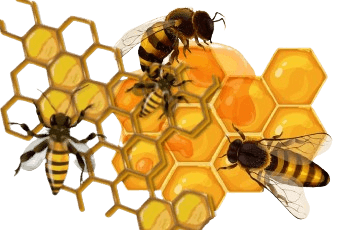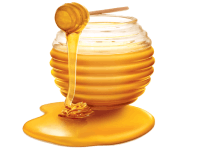The use of propolis dates back to ancient times. The Greeks, Romans, and Egyptians were familiar with the healing properties of propolis and used it in their medicinal practices. The word 'propolis' itself comes from the Greek words 'pro,' meaning 'in defence of,' and 'polis,' meaning 'city,' underscoring its protective role in the beehive, which is often referred to as the 'bee city.'
While propolis plays an essential role in beehives, it has also drawn considerable attention from researchers for its potential benefits to human health. The myriad of uses and benefits of propolis has made it an intriguing subject for scientists, medical practitioners, and health enthusiasts.

Bee propolis is a complex substance made up of around 300 different compounds. Its exact composition varies depending on the geographic location, the type of plants the bees have access to, and the time of year.
What is propolis? The primary components of propolis are resins and vegetable balsams (50%), waxes (30%), essential and aromatic oils (10%), and pollen (5%). Other ingredients include vitamins, minerals, and flavonoids, which are powerful antioxidants with anti-inflammatory properties. The rich and diverse composition contributes to its myriad of health propolis benefits.
Researchers have identified several compounds in propolis that have antibacterial, antiviral, antifungal, and anti-inflammatory effects. These include flavonoids, phenolics, and various types of acids. These are some of the secrets about what is propolis among many more.
Propolis has gained popularity in recent years due to its wide range of health benefits. Its rich composition of antioxidants, vitamins, minerals, and bioflavonoids makes it a potent natural health booster.
One of the most significant propolis benefits is its ability to boost the immune system. It stimulates the body's natural defences, helping to fight off common illnesses and infections. Its antibacterial and antiviral properties can help protect against harmful bacteria and viruses, making it an excellent supplement during cold and flu season.
This is one of the propolis benefits that can help reduce inflammation in the body, which is beneficial in managing conditions like arthritis, heart disease, and certain types of cancer.

While propolis offers numerous health benefits, it's crucial to use it correctly and safely. Propolis is available in various forms, including tablets, capsules, creams, and tinctures.
The recommended dosage of propolis varies depending on the individual's age, health status, and the condition being treated. As a general guideline, a daily dosage of 500mg to 3,000mg is typically considered safe for adults. However, it's always best to consult with a healthcare provider before starting any new supplement regimen.
There are few known side effects associated with propolis use, but some people may be allergic to it, especially those who are allergic to bees or bee propolis products. If you experience any adverse reactions such as hives, itching, swelling, or difficulty breathing, discontinue use immediately and seek medical attention.
Despite its numerous propolis benefits, some side effects and precautions should be taken into account when using propolis. Although rare, allergic reactions can occur, particularly in individuals who are allergic to bee products. Symptoms of an allergic reaction include itching, swelling, shortness of breath, and, in severe cases, anaphylaxis.
Pregnant and breastfeeding women are advised to avoid propolis unless under the supervision of a healthcare provider, as its safety during pregnancy and lactation is not well-documented. Individuals with asthma or other breathing problems should also exercise caution, as some studies suggest that propolis could exacerbate these conditions.

Beyond its potential health benefits for humans, propolis plays a crucial role in the beehive. Bee propolis is used to seal cracks and openings in the hive, providing insulation and protecting the hive from weather elements. It also serves as a disinfectant, preventing the spread of bacteria, viruses, and fungi within the hive.
Interestingly, bees also use propolis as a defence mechanism against potential invaders. When an intruder enters the hive, bees can encase them in propolis, effectively mummifying them and preventing the spread of disease.
Propolis is a remarkable natural substance with a wide range of potential health benefits. Its rich composition of antioxidants, vitamins, and bioflavonoids makes it a potent health booster. However, as with any supplement, it is critical that propolis be used according to food standards and under the guidance of a healthcare provider. From its origins in the beehive to its uses in human health, propolis truly is nature's ingenious creation whether you're interested in boosting your immunity, reducing inflammation, or simply exploring natural health options.